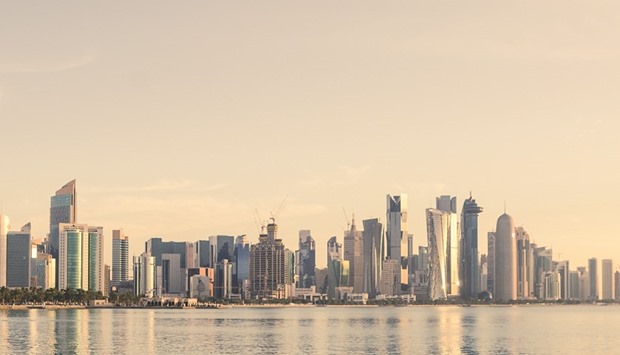Qatar’s new Public-Private Partnership (PPP) law should support investment and activity in the non-oil sector even as the stimulus package worth 13% of the country’s GDP may prop up domestic demand, a new report has shown.
The “strong” fiscal stimulus package to support the non-oil private sector should cushion the downturn caused by the lockdown following the Covid-19 pandemic, according to FocusEconomics.
The report said that Qatar’s fiscal balance as a percentage of GDP is set to rise to 4.6% in 2024 from an estimated -7.8% this year, from -7.8% this year.
The country’s merchandise trade balance may scale up to $48.5bn in 2024 from $25.9bn this year, it said.
According to FocusEconomics, Qatar’s public debt (as a percentage of GDP) has been forecast to fall to 55.3 from 71.5 this year.
The country’s public debt as a percentage of the gross domestic product will fall continuously over the next four years, the researcher said.
It is projected at 68.3 next year, 63.4 (in 2022) and 59.3 in 2023.
Qatar’s GDP has been estimated to reach $220bn in 2024 from $167bn this year.
Next year, it will be $181bn, followed by $194bn (2022) and $207bn in 2023.
GDP per capita, FocusEconomics said, has been estimated to reach $78,914 in 2024 from $60,518 this year.
GDP per capita next year will be $65,393, followed by $70,066 in 2022 and $74,501 in 2023.
Qatar’s economic growth in terms of nominal GDP will reach 6.2% in 2024 from -8.9% by the year-end.
Next year, economic growth in terms of nominal GDP will be 8.3%, 7.4% in 2022 and 6.6% in 2023.
The current account balance (as a percentage of GDP) will be 3.3 in 2024 compared with -3.9 in 2020, -0.1 (2021), 4.4 (2022) and 3.9 in 2023.
International reserves may exceed $36.2bn in 2024, from $34.7bn this year.
The country’s inflation, the report noted, will be -0.4% this year, 1.8% (2021) and 1.9% between 2022 and 2024.
Qatar’s unemployment rate (as a percentage of active population) will remain a meagre 0.2% in 2024, unchanged from this year.
According to FocusEconomics, Qatar’s economy “remains hamstrung” in the second quarter, after a “likely soft” Q1. “The lockdown and travel restrictions have “seemingly battered” domestic demand in recent months, and in particular the tourism and retail sectors.
“Moreover, weak hydrocarbon prices weighed heavily on merchandise exports, which plummeted nearly 50% in April. Since May, the economy has begun to gradually restart, which should prop up industrial activity, but international travel remains restricted, boding ill for external demand,” the report said.
Moreover, Qatar Petroleum announced an approximate 30% spending cut this year (due to Covid-19’s impact on the energy sector), which should weigh on energy investment prospects in the second half of the year. “Nevertheless, a 13% of GDP stimulus package should prop up domestic demand somewhat,” the report said.
The “strong” fiscal stimulus package to support the non-oil private sector should cushion the downturn, although the economy is expected to contract this year, FocusEconomics said.
The report said that Qatar’s fiscal balance as a percentage of GDP is set to rise to 4.6% in 2024 from an estimated -7.8% this year, from -7.8% this year.
The country’s merchandise trade balance may scale up to $48.5bn in 2024 from $25.9bn this year, it said.
According to FocusEconomics, Qatar’s public debt (as a percentage of GDP) has been forecast to fall to 55.3 from 71.5 this year.
The country’s public debt as a percentage of the gross domestic product will fall continuously over the next four years, the researcher said.
It is projected at 68.3 next year, 63.4 (in 2022) and 59.3 in 2023.
Qatar’s GDP has been estimated to reach $220bn in 2024 from $167bn this year.
Next year, it will be $181bn, followed by $194bn (2022) and $207bn in 2023.
GDP per capita, FocusEconomics said, has been estimated to reach $78,914 in 2024 from $60,518 this year.
GDP per capita next year will be $65,393, followed by $70,066 in 2022 and $74,501 in 2023.
Qatar’s economic growth in terms of nominal GDP will reach 6.2% in 2024 from -8.9% by the year-end.
Next year, economic growth in terms of nominal GDP will be 8.3%, 7.4% in 2022 and 6.6% in 2023.
The current account balance (as a percentage of GDP) will be 3.3 in 2024 compared with -3.9 in 2020, -0.1 (2021), 4.4 (2022) and 3.9 in 2023.
International reserves may exceed $36.2bn in 2024, from $34.7bn this year.
The country’s inflation, the report noted, will be -0.4% this year, 1.8% (2021) and 1.9% between 2022 and 2024.
Qatar’s unemployment rate (as a percentage of active population) will remain a meagre 0.2% in 2024, unchanged from this year.
According to FocusEconomics, Qatar’s economy “remains hamstrung” in the second quarter, after a “likely soft” Q1. “The lockdown and travel restrictions have “seemingly battered” domestic demand in recent months, and in particular the tourism and retail sectors.
“Moreover, weak hydrocarbon prices weighed heavily on merchandise exports, which plummeted nearly 50% in April. Since May, the economy has begun to gradually restart, which should prop up industrial activity, but international travel remains restricted, boding ill for external demand,” the report said.
Moreover, Qatar Petroleum announced an approximate 30% spending cut this year (due to Covid-19’s impact on the energy sector), which should weigh on energy investment prospects in the second half of the year. “Nevertheless, a 13% of GDP stimulus package should prop up domestic demand somewhat,” the report said.
The “strong” fiscal stimulus package to support the non-oil private sector should cushion the downturn, although the economy is expected to contract this year, FocusEconomics said.


